Published Sep 7, 2016
John Trimble's Contribution to Saving Star Trek
John Trimble's Contribution to Saving Star Trek
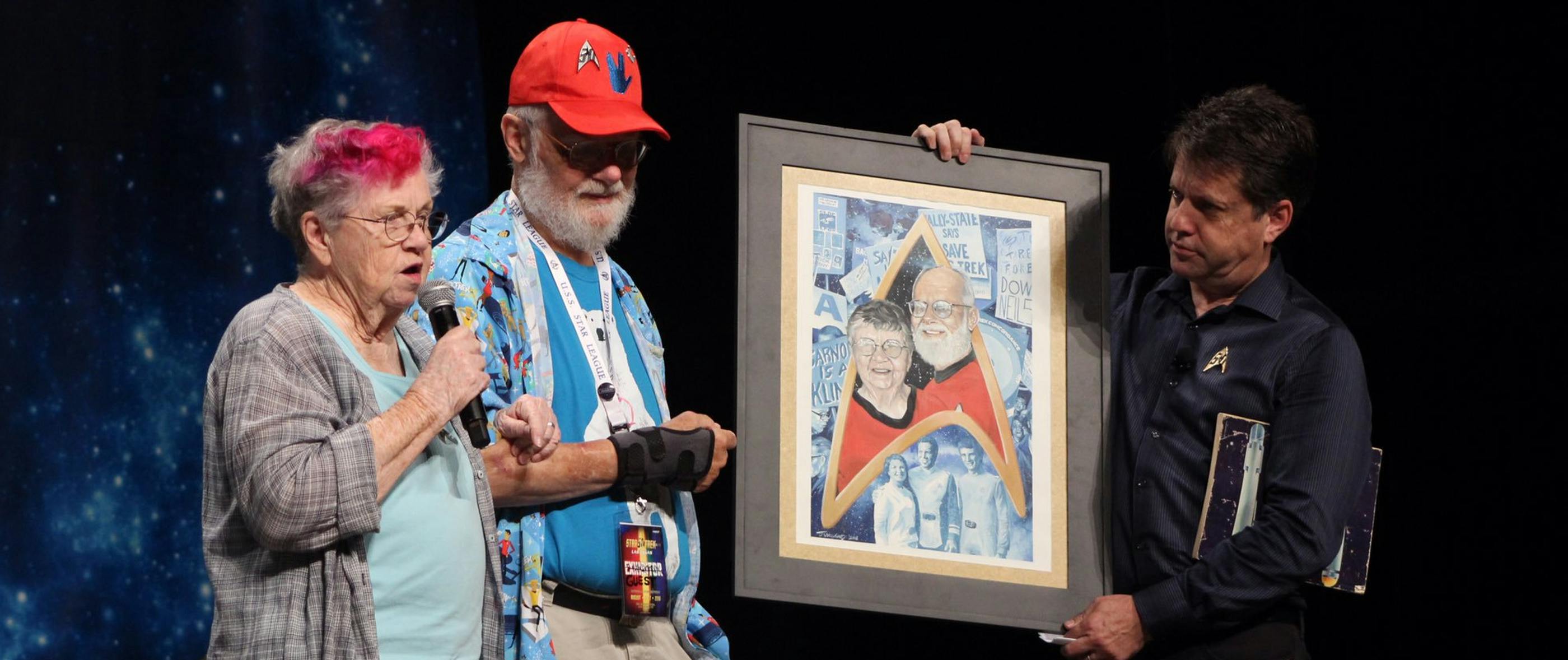
StarTrek.com
There’s really no other way to put this: Were it not for the efforts of Bjo and John Trimble, the couple who launched the grassroots Save Star Trek letter-writing campaign after NBC cancelled The Original Series following season two, odds are Star Trek would be an afterthought today, a failed and forgotten series. There’d be no movies or spin-off series. And there’d be no StarTrek.com. There’s really no other way to put this, either: John Trimble was as active a participant in the Save Star Trek campaign as Bjo Trimble. The media, back in the day and even now, preferred the story of the little woman who spoke up. It sounded better, sure, but it did John an injustice.
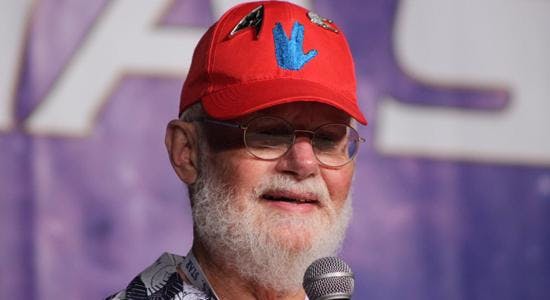
Bjo has always made sure to mention John and his contributions over the years, but it was usually just that, a mention. For whatever reason, journalists didn’t want to hear the full story or, if they heard it, they didn’t necessarily bother to run it. CBS Consumer Products honored Bjo and John a few weeks back, surprising the couple by bringing them on stage to publicly thank them in front of thousands of fans at Star Trek Las Vegas and presenting a painted portrait of them created by the artist JK Woodward. Right before the surprise presentation, StarTrek.com sat down with the Trimbles to discuss, in detail, John’s participation in the legendary Save Star Trek campaign. In fact, while we really DID want to finally and fully share the story of John’s role, we timed our chat with the Trimbles so that we could get them backstage at the right moment for the surprise presentation. Here’s how the conversation went down, right through to the point it was time to get them backstage…
Bjo got the lion’s share of the credit for the Save Star Trek campaign. John, were you perfectly willing just to let Bjo have the spotlight?
JOHN: Pretty much, yeah, I was willing to do whatever worked. My feeling was if the press wanted to give her all the credit, that was relatively OK. I'd like them to notice me a little bit, but it wasn't a big ego thing.
BJO: He doesn't seem to have much ego.
JOHN: My feeling is it was a simple thing of you got two names. John… every Tom, Dick, and Harry's name is John, and Bjo. Which name are you going to remember? Of course, they’re going to remember Bjo.
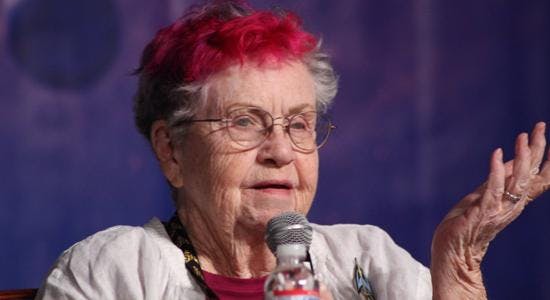
Was it frustrating for you, Bjo, that this happened?
BJO: Sure it was frustrating.
Take us through that. Why, and could you do anything about it?
BJO: Well, this was before the internet. Way earlier, and it was just frustrating. I would correct the newsmen even as they were interviewing me. We still have the problem. I’ll do an interview and John will be right there with me, and they’ll still sometimes just talk to me. Or, I had to even bring him over and they would still ignore him. Getting the message out about this sort of thing is important to me, because it’s not just the researchers getting it wrong, but the interviewers, too. We’re a team. I’ve found it very frustrating.
So, is this a little bit of vindication and justice that here we are on the 50th anniversary?
BJO: It certainly is.
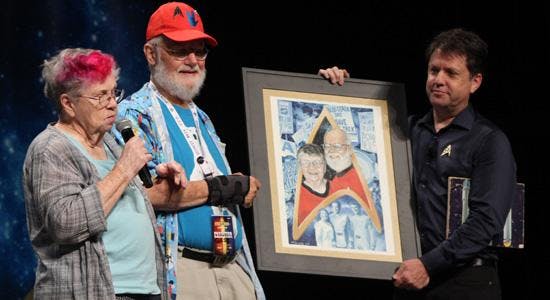
And this was on the big stage at Star Trek Las Vegas, in front of 5,000 people, and again, earlier in the week, on the secondary stage. It was said out loud – by the moderator in the small room, by John Van Citters of CBS Consumer Products on the main stage -- in front of 5,000 people…
JOHN: It was very gratifying to me. There's not a whole lot of ego involved in this, but it still now, after all this time, rankles when they don't credit me, only because I was actually there with Bjo, doing the work.
BJO: He's only human.
JOHN: That was my human side. I try not to let it do a whole lot. So this has been wonderful. I'm very glad. I'm very surprised.
What did it mean to you, Bjo?
BJO: It meant the world, really. I looked over at John and I seriously wanted them to acknowledge the fact that he was a part of all of this and that he we were partners as we have been for all these years.
You’re married 56 years, right?
BJO: 56 years.
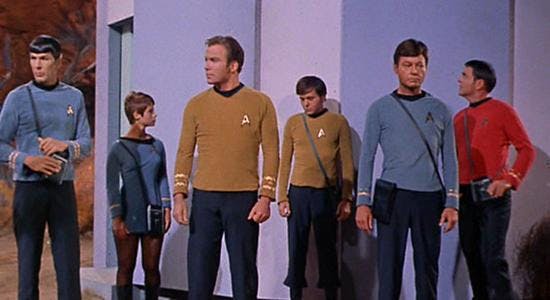
John, what did you actually do? Who did what in terms of the campaign?
JOHN: When we saw the change in the cast and crew during the filming of “The Deadly Years” from what it had been before, we knew something was going on. It had been a very up cast and crew, and now it was very down, the mood. We found out by going to craft services, the underground gossip source, that they were probably going to cancel the show after the second season. We had to leave and go back to Oakland, where we lived at the time, and on the way we were talking about what a change it had been in the cast. I turned to Bjo and I said, "There ought to be something we can do about that," knowing full well that that was throwing down the challenge.
BJO: The thing is, he knew that, by challenging me, we’d have to do something. But he is the one who started the whole thing, really.
JOHN: We spent the rest of the trip going up the Central Valley, before Interstate 5, back to Oakland, discussing how to do it and putting together the Save Star Trek campaign.
BJO: We had no template. At that point ...
You guys basically created the template.
BJO: Yes, which we shared, by the way, with anyone, who ever asked. We knew, of course, we were going to have to both mail letters. John went down to the post office, learned all about mail rules, and brand new was the zip code system. They told us, flat out, that if material wasn't zip coded it wouldn't go out as bulk mail, that it would just sit in the post office. John got all the books in those days, and it was stacks of them, and learned about the zip code rules. And we came home and put those into effect when we mailed out letters. John was downstairs with a hand-cranked mimeograph machine, turning out the letters, which we still have a copy or two. We folded them, labeled them and stamped them, and put them in bulk mail. He was doing a whole bunch of the physical work, the grunt work. I was more getting people over to help us. I was doing things like cooking spaghetti or cooking chili. It was actually wonderful. They would bring in potluck to go with that. We would work the volunteers hard all weekend. John was everywhere; he was the one who ran the errands. He's the one who lifted, toted, and basically it simply was not possible for me to do it alone. This is why we're a pair.
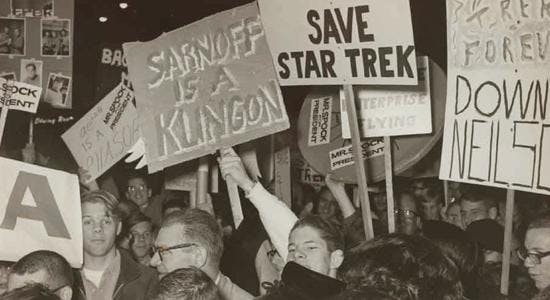
At the time, did the players involved know? Did Nimoy? Did Roddenberry, etc., know?
BJO: No. Well…
JOHN: Roddenberry knew because we had to ask him when we formulated this idea. We had to call down and find out if he actually wanted us to do this or if he'd thrown in the towel.
And he wanted you to?
JOHN: Yeah. He's claimed that he had just come out of a meeting with his staff saying if there was only some way we could reach the fans and we fell in his lap. That may or may not be true. Gene was very good about the apocryphal. In any case, he was enthusiastic about us doing it. I don't think the cast and crew had any idea at the time.
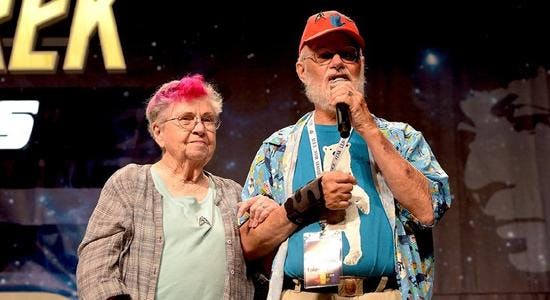
When it worked, was Roddenberry appreciative?
JOHN: Oh, yeah.
BJO: Gosh, it's hard to explain this unless you know Hollywood. He was about as appreciative as a standard producer would be if somebody had saved his show. You notice that we're not independently wealthy. Neither Paramount, nor Gene, were particularly generous with us, but Gene did then, when John lost his job, offer us a job of answering the Star Trek fan mail for a while. We convinced him that there was merchandising possibilities in Star Trek. Go to the vendor's room now. We started making Lincoln Enterprises for him. We'd already had mail order experience. We put it all together. In fact, our first year, everything had to be slipped into a flat envelope because we couldn't afford the boxes for dimensional things. It really worked. People were very happy. They really liked getting the, let's see, I think it was little stickers of the insignia and a Starfleet Academy graduation certificate and…
JOHN: Film strips.
BJO: Nobody believed those were real. I discovered that when I browsed all over the set and all over the lot and when I visited the cutting room one day… here's all of these film clips going into these bags that were going out to the trash. I said, "Can I have some of those?" The man just reached into the package and handed me this huge handful. I thought, “There's a little convention coming up in L.A. “We cut up some of the film clips and took them and raffled them off and people went berserk. We went back to Gene and we said, "Yes, there's merchandising possibilities and especially with the film clips."
JOHN: Gene began having the cutting room save the outtakes and getting bags full of them. We got together with friends and chopped them up -- and the rest is history. Sometimes we just put them in little coin envelopes. You'd get X number of outtakes. We guaranteed that they were different scenes and that sort of thing. The fans just went nuts for that.
BJO: Gene finally rented an office down in downtown Hollywood and we had a helper that we hired. At that point, Gene had retrieved some 40 bags of fan mail that had been sitting in the back of the Paramount mailroom without anybody telling him that these things were not being answered. We ended up with all of those and so ... It was a little crowded in this tiny office for a while, but we would sort them by zip code.
JOHN: We had pictures of all the various actors and so on, and would send out pictures if they asked for them.
BJO: We had a picture of the U.S.S. Enterprise because a lot of kids asked for autographed pictures. And John said, "How are we going to do that?" I said, "Simple." I picked up a pen and I autographed, "Dear Sandy, thank you for asking. Stay in school. Sincerely, the U.S.S Enterprise." I wonder how many of those are in collections today. Surely, as people grew up, they realized that the ship did not sign any autographs. It was fun.
I think they want you to see something backstage. Let’s check it out.
BJO: OK.
JOHN: Sure.
